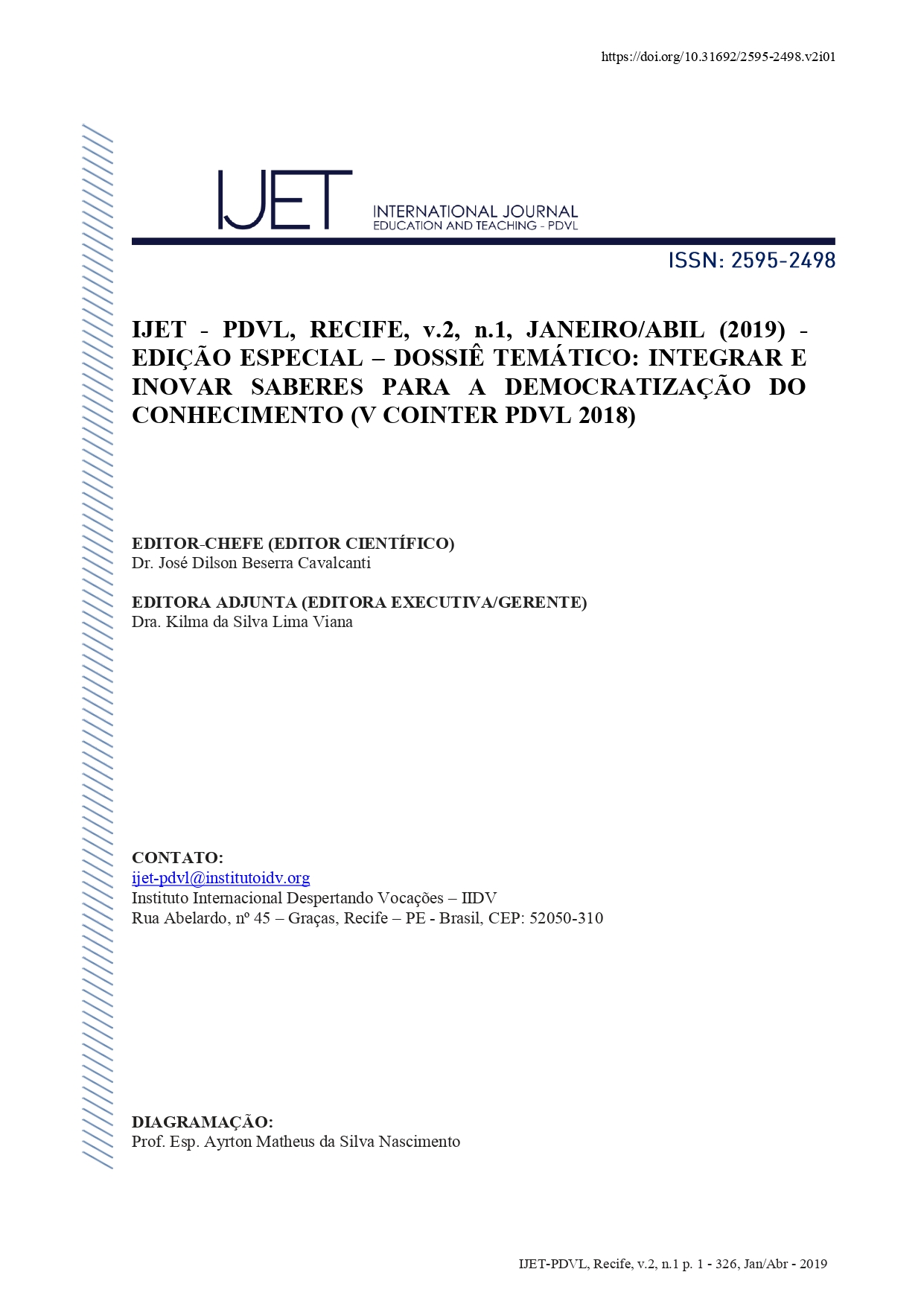UTILIZATION OF DIDACTIC TOOLS IN CHEMISTRY TO ENHANCE THE TEACHING-LEARNING PROCESS
Keywords:
Chemistry Education, Contextualization, Experimentation, Teaching-learning Process, Mixing SeparationAbstract
Many students have a lack of interest in school and studies, due to several factors that include the didactics used by the teacher. This reality is even more alarming when we approach the exact sciences, mainly the discipline of Chemistry that presents concepts and abstract theories. According to the official document PCNEM (National Curriculum Parameters for High School), all subjects transmitted in the classroom should have a contextualized approach in order to achieve meaningful learning, which the concepts present a relevant value that favors the understanding of the natural world, social, political and economic, praising the applicability in the life of the student. Thus, this paper describes the results of a research developed for high school students, which was based on a qualitative methodology of participatory nature, and also presented a quantitative approach. The study was directed to the contents: mixtures, solubility and separation of mixtures, which were explained with the use of several didactic tools, such as contextualization, problematization and experimentation, through dialogic expository classes. The results were interpreted through qualitative methods, which evaluate knowledge as a social process, in which all participate for its construction through its daily reality, behavior and posture used in the classroom, also to a quantitative analysis, which evaluates the progression of learning in a systematic way. In view of the analyzed results, it can be stated that the didactic tools employed allowed the construction of a significant chemical knowledge, so that each student participated actively during the teaching-learning process, perceiving the science inserted in their daily life, which makes it the students act critically in the situations.
Downloads
References
ANDRÉ, Marli E.D.A. Educação e Contemporaneidade. Revista da FAEEBA, v. 22, n. 40, p. 95-103, 2013
BRASIL (País) Secretaria de Educação Média e Tecnológica - Ministério da Educação e Cultura. Parâmetros Curriculares Nacionais do Ensino Médio. Brasília: MEC/SEMTEC, 1999.
_______. Orientações Educacionais Complementares aos Parâmetros Curriculares Nacionais: Ciências da Natureza, Matemática e suas Tecnologias. Brasília: MEC/SEMTEC, 2002.
_______. Orientações Curriculares para o Ensino Médio: Ciências da Natureza, Matemática e suas Tecnologias. Secretaria de Educação Básica. – Brasília: Ministério da Educação, Secretaria de Educação Básica, 2006.
FREIRE, P. Pedagogia da autonomia: saberes necessários à prática educativa. 51a ed., São Paulo: Paz e Terra, 2015.
FREIRE, P. Pedagogia do oprimido. 50ª ed. Rio de Janeiro: Paz e Terra, 2011.
LAKATOS, E. M.; MARCONI, M. A. Metodologia científica. 4ª ed. São Paulo: Atlas, 2004.
LUIZ, W., PACHECO, R. Educação em Química. São Paulo: Unijuí, 1997.
OLIVEIRA, L. M. S.; SILVA, O. G.; FERREIRA, U. V. S. Desenvolvendo jogos didáticos para o ensino de química. HOLOS, 2011, v. 5, p.166 – 175. Disponível em: <http://www2.ifrn.edu.br/ojs/index.php/HOLOS/article/view/567>. Acesso em: 14 Set 2018.
OLIVEIRA, R.; CACURO, T. A.; FERNANDEZ, S.; IRAZUSTA, S. P. Aprendizagem Significativa, Educação Ambiental e Ensino de Química: Uma Experiência Realizada em uma Escola Pública. Revista Virtual de Química, v. 8, nº 3, p. 913-925, 2016.
REIS, Martha. Química vol. 1. São Paulo: Editora Ática, 2016
SALESSE, A. M. T. A experimentação no ensino de química: importância das aulas práticas no processo de ensino aprendizagem. Dissertação (especialização em Métodos e Técnicas de Ensino, Modalidade de Ensino a Distância), 2015.
SILVA, V. G. A importância da experimentação no ensino de química e ciências. Trabalho de Conclusão de Curso – TCC. Universidade Estadual Paulista. Bauru, 2016.
STRECK, D. R. Metodologias participativas de pesquisa e educação popular: reflexões sobre critérios de qualidade. Revista Interface: Comunicação, Saúde, Educação, vol. 20, n. 58, p. 537-547, 2016.

Downloads
Published
Conference Proceedings Volume
Section
License
Copyright (c) 2019 ALESSANDRA MARCONE TAVARES ALVES DE FIGUEIRÊDO , JOAB DOS SANTOS LIMA, VICENTE MAXIM DA SILVA ARAÚJO, FLÁVIA RHUANA PEREIRA SALES, MÁRCIO JEAN FERNANDES TAVARES (Autor)

This work is licensed under a Creative Commons Attribution 4.0 International License.






